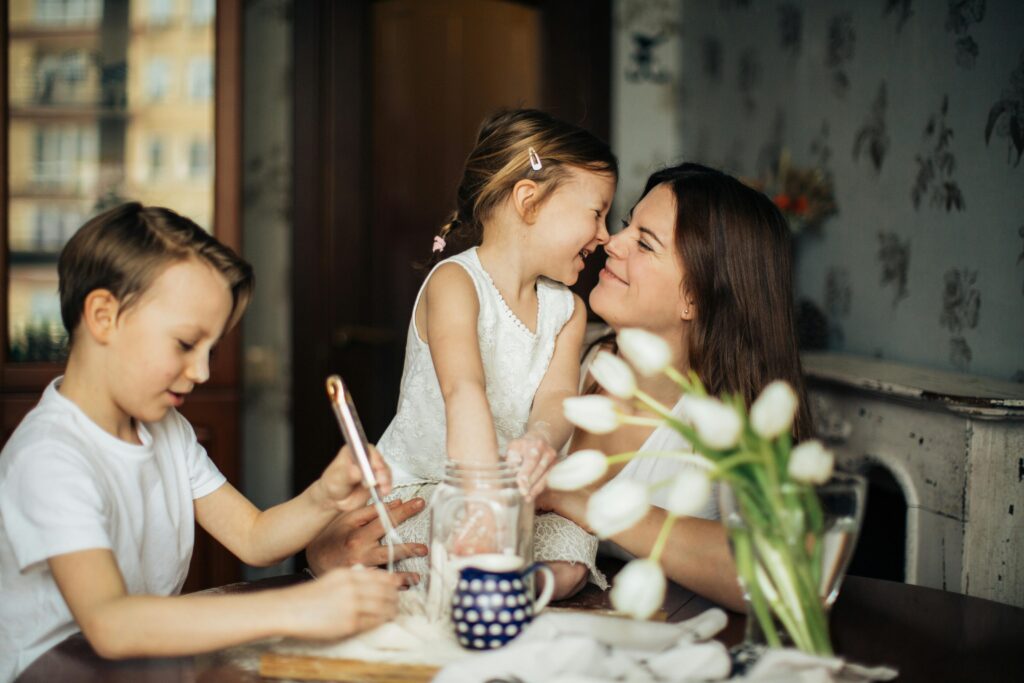Myths #3 and #4 about Sleep Training – Debunked!
July 12, 2024

This is the 2nd of 4 blog posts where we’re looking at 8 common myths about sleep training. If you missed the first post, take a look.
There’s a lot of misinformation and judgment about sleep training. To me, sleep training means teaching a child independent, age-appropriate sleep habits. My goal and priority is to always support a family in a way that feels right for them. This means without judgment and always with kindness and understanding. I hope we can start to move the conversation about sleep training to be about each family doing what’s right for them even if it’s different than what you would choose through a lens of support.
When looking into sleep training, many parents become worried about whether it will cause their child harm and affect the bond they have with their baby. On one hand, you want better sleep for yourself and your little one, but you’re worried about how to get there and whether it’s safe. Let’s take a closer look at this idea and dispel any myths.
Sleep training could harm my child in the long-term
Firstly, there is no evidence that sleep training harms your baby in the long-term. However, sleep training is one of the most controversial topics in early parenting. Studies examining sleep training in young children have shown short-term benefits for both the parent and child without any evidence for long-term negative consequences for both parent and child. The literature shows that sleep training results in improved sleep for parent and child, lowers rates of maternal depression, and improves family functioning.1 Having a parent who is well rested and healthy mentally and physically, is a key factor in your child’s success and health.
Sleep training will hurt the bond with my baby
Many parents are concerned how sleep training will affect their bond with their infant. This is an especially common concern if you currently feed or snuggle your baby to sleep. You can have it both ways – a strong and attached bond and a baby who falls asleep independently. You can still feed and cuddle your baby before bed in the sleep training process; we usually have you do these two things earlier in the bedtime routine instead of letting them fall asleep in your arms. With sleep training, the goal is to have your baby not associate feeding or rocking with falling asleep.
A study1,2 done in 2012 shows that after 5 years of sleep training, no differences in attachment were found with children who had and those who hadn’t been sleep trained. In addition, I often hear from families who have finished sleep training that they have more positive relationship with their child now that both parties are well rested.
Stay tuned in 2 weeks for the next post addressing the next two sleep training myths: myth #5 I cannot sleep train my baby if I breastfeed and myth #6 sleep regressions are a bad thing.
References
- Hiscock H, Bayer JK, Hampton A, Ukoumunne OC, Wake M. Long-term mother and child mental health effects of a population-based infant sleep intervention: cluster-randomized, controlled trial. Pediatrics. 2008 Sep;122(3):e621-7. doi: 10.1542/peds.2007-3783. PMID: 18762495.
- Price AM, Wake M, Ukoumunne OC, Hiscock H. Five-year follow-up of harms and benefits of behavioral infant sleep intervention: randomized trial. Pediatrics. 2012 Oct;130(4):643-51. doi: 10.1542/peds.2011-3467. Epub 2012 Sep 10. PMID: 22966034.